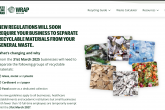New workplace recycling rules come into force across England
Businesses with 10 or more employees must now separate recyclables and food waste under Simpler Recycling legislation
 New regulations requiring businesses and workplaces in England to separate recycling from general waste have come into force today (31 March), with the aim of boosting the country's stalled recycling rates.
New regulations requiring businesses and workplaces in England to separate recycling from general waste have come into force today (31 March), with the aim of boosting the country's stalled recycling rates.
The measures, part of the Government's Simpler Recycling plans, require workplaces with 10 or more employees to arrange for the separate collection of dry recyclable materials, food waste, and residual waste.
The legislation replaces previous proposals that could have required businesses to maintain up to six separate waste streams, offering what the Department for Environment, Food and Rural Affairs (Defra) describes as "a sensible, pragmatic approach" that will deliver environmental benefits and potential cost savings.
Under the new rules, workplaces must separate paper and card from other dry recyclables unless their waste collector collects them together. Businesses maintain flexibility regarding container sizes and collection frequency based on their specific waste volumes.
Circular Economy Minister Mary Creagh said: "We are committed to ending the throwaway society, boosting recycling rates which have stalled for too long, and driving growth through the Government's Plan for Change."
"Simplifying the rules for workplaces will make recycling easier, maximising environmental benefits, delivering cost savings and stimulating growth," Creagh added.
Support for businesses
Responsibility for regulation of the Simpler Recycling legislation now falls to the Environment Agency, which has pledged to support businesses through the transition.
Steve Molyneux, deputy director of waste and resources regulation at the Environment Agency, said: "The implementation of Simpler Recycling for workplaces is a pivotal moment and a huge step forward, driving change in the waste market, optimising the use of our precious resources, and contributing to a circular economy."
"We are committed to supporting businesses with their new duties. We will take a pragmatic approach to implementation and will work with stakeholders to support them in overcoming any difficulties they might face in relation to compliance," Molyneux added.
To help businesses prepare for the new requirements, the Waste and Resources Action Programme (WRAP) has launched 'Business of Recycling', a specialist website providing tailored guidance for different sectors.
The online resource includes downloadable assets, waste calculators, and specific information for various business types, offering practical support for companies navigating the new requirements.
Addressing recycling disparities
The new regulations aim to address the significant disparity between home and workplace recycling habits. Research has shown that recycling rates in workplaces are considerably lower than those in domestic settings, with inconsistent collection systems cited as a major barrier.
Household recycling rates in England have stagnated at around 44-45 per cent since 2015, far below the Government's ambition to recycle 65 per cent of municipal waste by 2035.
The new regulations mark the first phase of the wider Simpler Recycling programme, with household collections set to follow next year. Local authorities will need to implement similar standardised collections by March 2026, while smaller workplaces with fewer than 10 employees have until March 2027 to comply with the requirements.
The legislation also includes future provisions for kerbside plastic film collections, scheduled to begin by March 2027.
The implementation follows Environment Secretary Steve Reed's announcement of a new plan to transform the nation's economy on 27 March.






